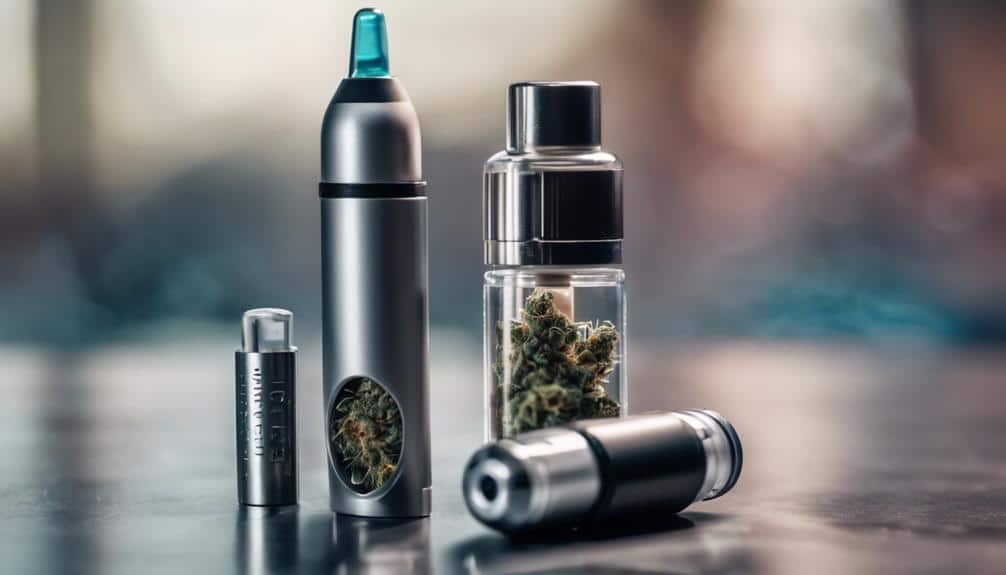Imagine a patient with chronic pain receiving a nasal spray of cannabinoids and experiencing relief within minutes. By 2024, personalized cannabis medicine has transformed treatment approaches by leveraging genomics to tailor therapies to individual genetic profiles. This advancement, along with new delivery methods like transdermal patches, promises improved efficacy and fewer side effects. Discover how these breakthroughs, spanning from cancer treatments to mental health applications, are reshaping medical marijuana’s role in healthcare. Curious about how these innovations are impacting specific conditions?
Personalized Cannabis Medicine

Advancements in genomics and biotechnology frequently enable the customization of cannabis treatments to align with individual genetic profiles. By leveraging genetic profiling, healthcare providers can identify how a patient’s unique genetic code interacts with cannabinoids, optimizing therapeutic outcomes. This precision approach mitigates adverse effects and maximizes efficacy, making it a groundbreaking development in personalized medicine.
You play an essential role in implementing these innovations. By conducting thorough genetic profiling, you can decipher specific gene variants that influence a patient’s response to various cannabis strains and formulations. This information allows you to prescribe tailored dosing regimens that cater to the individual’s physiological and biochemical needs. For instance, patients with a genetic predisposition to metabolize THC rapidly may benefit from higher doses or alternative cannabinoids to achieve the desired therapeutic effect.
Tailored dosing not only enhances treatment efficacy but also fosters patient trust and satisfaction. When patients experience a reduction in symptoms with minimal side effects, it validates your dedication to personalized care.
As you adopt these advanced methodologies, you contribute to a more detailed and effective approach to medical marijuana, ultimately elevating the standard of patient care.
New Pain Management Options
How can the latest advancements in medical marijuana offer novel and effective pain management options for patients suffering from chronic conditions?
Recent studies highlight the efficacy of THC analgesics in providing significant pain relief. These THC-based treatments work by interacting with the body’s endocannabinoid system, modulating pain signals and reducing inflammation. This direct action can result in substantial alleviation of chronic pain symptoms, particularly in conditions like neuropathy and arthritis.
Terpene synergy, another breakthrough, enhances these effects. Terpenes are aromatic compounds found in cannabis that work synergistically with cannabinoids like THC. This interaction, known as the entourage effect, amplifies pain-relieving properties while potentially minimizing side effects.
For instance, terpenes such as myrcene and linalool have shown promise in enhancing the analgesic effects of THC, providing a more comprehensive pain management solution.
Breakthroughs in Cancer Treatment

Recent advancements in medical marijuana research reveal promising therapeutic potentials for cancer treatment. They are particularly effective at alleviating chemotherapy-induced side effects and inhibiting tumor growth. Clinical studies show that cannabinoids like THC and CBD exhibit tumor suppression properties. These compounds can induce apoptosis in cancer cells, reducing tumor viability. Experimental evidence indicates that cannabinoids may disrupt cancer cell proliferation by modulating signaling pathways involved in cell cycle regulation.
Furthermore, the synergy between chemotherapy and cannabinoids has gained attention. Combining cannabinoids with traditional chemotherapy agents appears to enhance the anti-tumor effects while mitigating adverse reactions. For instance, patients undergoing chemotherapy often experience severe nausea, vomiting, and neuropathic pain. Cannabinoids have demonstrated efficacy in alleviating these symptoms, improving patient compliance and overall quality of life.
In addition, preclinical models have shown that cannabinoids can sensitize tumor cells to chemotherapy, potentially lowering the required dosages and minimizing toxic side effects. This dual action—tumor suppression and chemotherapy synergy—positions medical marijuana as a critical adjunct treatment in oncology.
As more rigorous trials are conducted, you can anticipate a shift in standard cancer care protocols to integrate these findings, ultimately improving patient outcomes and survival rates.
Advances in Neuroprotection
Amid the growing body of research, medical marijuana has emerged as a promising candidate for neuroprotection. It shows potential to mitigate neurodegenerative processes and enhance neural recovery.
Cannabinoids like cannabidiol (CBD) and tetrahydrocannabinol (THC) exhibit antioxidative and anti-inflammatory properties critical for brain health. These compounds interact with the endocannabinoid system to regulate neuroinflammation and oxidative stress—both implicated in conditions like Alzheimer’s disease, Parkinson’s disease, and multiple sclerosis.
Recent studies demonstrate that medical marijuana can slow the progression of neurodegenerative diseases by reducing neuronal damage and promoting synaptic plasticity. This means you can potentially preserve cognitive function longer and improve quality of life for patients facing these challenging conditions.
Moreover, emerging evidence suggests that cannabinoids may enhance neural recovery post-injury, supporting brain health through mechanisms like neurogenesis and the inhibition of excitotoxicity. These findings mark a significant step forward in cognitive preservation, offering new hope for therapies aimed at maintaining mental acuity and delaying the onset of cognitive decline.
Innovative Delivery Methods

Innovative delivery methods for medical marijuana are enhancing its therapeutic efficacy and patient compliance. Technologies like nasal sprays and transdermal patches are revolutionizing how patients receive cannabinoids, ensuring more precise dosing and faster onset of action.
Nasal sprays offer rapid absorption through the mucosal membrane, providing almost immediate relief for conditions like acute pain and anxiety. This method bypasses the digestive system, reducing the risk of gastrointestinal side effects.
Transdermal patches provide a steady release of cannabinoids over an extended period. This consistent delivery minimizes peaks and troughs in medication levels, ensuring sustained therapeutic effects and improved symptom management. These patches are particularly beneficial for chronic pain sufferers and those with conditions requiring around-the-clock treatment.
These advanced methods are:
- Life-changing for those struggling with acute and chronic pain
- Empowering patients by offering discreet and convenient usage
- Reducing stigma associated with traditional marijuana consumption methods
- Enhancing patient adherence due to ease of use and controlled dosing
Enhanced CBD Therapies
Enhanced CBD therapies are revolutionizing the medical field by providing targeted treatments with fewer side effects compared to traditional pharmaceuticals.
You can now leverage the synergistic effects of terpenes, known as terpene synergy, to enhance the therapeutic efficacy of CBD. Terpenes are aromatic compounds found in cannabis that work in concert with cannabinoids to amplify their benefits, offering a more holistic approach to treatment.
A significant advancement in enhanced CBD therapies is dosage optimization. By tailoring the dosage to individual patient needs, you guarantee maximum therapeutic benefit while minimizing adverse effects. This personalized approach relies on precise measurements and careful monitoring, leading to better outcomes and increased patient satisfaction.
Clinical studies have demonstrated that optimized CBD dosages, when combined with specific terpene profiles, can effectively address a range of conditions—from chronic pain to anxiety disorders.
This means you can offer your patients a treatment that not only targets their symptoms more effectively but also enhances their overall quality of life.
Pediatric Care Innovations

Pediatric care innovations in medical marijuana focus on developing safe and effective treatments specifically tailored for children with severe conditions such as epilepsy and autism. These advancements aim to provide symptom relief while ensuring minimal side effects, leveraging evidence-based research to guide clinical practice.
Recent breakthroughs in epilepsy treatment have shown promising results, with cannabinoids reducing seizure frequency and severity in pediatric patients. One critical area of development is the establishment of precise dosing guidelines, ensuring that each child receives an ideal therapeutic dose without adverse effects.
- Reduced seizure frequency: Children experiencing fewer seizures can lead more normal lives.
- Improved quality of life: Enhanced symptom management allows children to engage more fully in daily activities.
- Parental relief: Effective treatments can reduce the emotional and physical strain on families.
- Hope for the future: Ongoing research offers the promise of even better therapies.
These innovations are grounded in rigorous clinical studies and a commitment to patient safety. By refining treatment protocols and dosing guidelines, you can greatly improve care and outcomes for children suffering from debilitating conditions.
Your dedication to serving others in this evolving field makes a profound difference in the lives of these young patients and their families.
Mental Health Applications
As research continues to reveal the complexities of mental health, medical marijuana is emerging as a viable adjunct therapy for conditions such as anxiety, depression, and PTSD. Recent studies have demonstrated that cannabinoids—particularly cannabidiol (CBD) and tetrahydrocannabinol (THC)—can modulate neurochemical pathways associated with mood regulation and stress response.
CBD has shown promise for anxiety relief by interacting with serotonin receptors, thereby enhancing mood stability and reducing hypervigilance. In depression management, medical marijuana’s effectiveness is attributed to its ability to influence the endocannabinoid system which plays an important role in emotional regulation. THC—in controlled dosages—can elevate mood and promote a sense of well-being, crucial for patients experiencing depressive episodes. Additionally, evidence suggests that the anti-inflammatory properties of cannabinoids may mitigate neuroinflammation linked to depression, offering a dual benefit.
For PTSD, medical marijuana has been found to reduce the severity of symptoms such as nightmares and hyperarousal by modulating the brain’s fear circuitry. It’s clear that incorporating medical marijuana into mental health treatment regimens could enhance therapeutic outcomes, providing a more inclusive approach to mental health care.
Autoimmune Disease Treatments

Building on its potential in mental health, medical marijuana is also showing promising results in treating autoimmune diseases by modulating immune responses and reducing inflammation. The cannabinoids in marijuana interact with the body’s endocannabinoid system which plays an essential role in immune modulation and inflammation reduction. This interaction can help manage conditions like rheumatoid arthritis, multiple sclerosis, and lupus.
Research indicates that medical marijuana can decrease the production of pro-inflammatory cytokines thereby reducing inflammation. Additionally, it may increase the production of anti-inflammatory cytokines further contributing to immune modulation. Patients with autoimmune diseases often experience chronic pain and inflammation; medical marijuana could offer a new avenue for symptom management without the severe side effects of traditional immunosuppressive drugs.
- Hope for relief: Imagine patients experiencing less pain and more mobility.
- Reduced side effects: Envision a future with fewer adverse reactions compared to conventional therapies.
- Improved quality of life: Think of the joy in seeing loved ones live more comfortably.
- Empowering patients: Picture giving individuals more control over their health.
This evidence-based approach highlights the potential for medical marijuana to serve as a valuable tool in the arsenal against autoimmune diseases, offering hope and relief to those affected.
Improved Bioavailability Techniques
Advancements in bioavailability techniques are revolutionizing how medical marijuana is absorbed and utilized by the body, ensuring patients receive more consistent and effective therapeutic outcomes.
A primary breakthrough involves nanotechnology integration. By reducing cannabinoid molecules to nano-sized particles, you can greatly enhance their absorption rate. This method increases the surface area making it easier for the body to absorb cannabinoids more efficiently.
Lipid-based formulations have also shown considerable promise in improving bioavailability. Cannabinoids are lipophilic—they dissolve better in fats than in water. By incorporating cannabinoids into lipid-based carriers, you can enhance their solubility and stability leading to better absorption in the gastrointestinal tract.
These techniques are particularly beneficial for patients who require precise dosing and quick onset of therapeutic effects. For instance, those suffering from chronic pain or severe nausea can experience more immediate relief. Furthermore, these advancements also reduce variability in effects between different patients ensuring a more standardized therapeutic outcome.
Conclusion
You’ve now seen how medical marijuana breakthroughs of 2024 light up like a guiding star in healthcare’s field. With personalized medicine, innovative delivery methods, and diverse treatment applications, these advancements symbolize a new dawn for patient care.
As these techniques continue to evolve they promise to illuminate the way toward more effective, tailored treatments, offering hope and healing where traditional methods have faltered. The future of medical marijuana is undeniably bright.
If you’re curious to learn more about these exciting developments and how they can benefit you or your loved ones, I’d love to invite you to visit Fells Point Cannabis Docs of Maryland. Feel free to drop by or give us a call at (410) 401-4200.
Our friendly and knowledgeable team is here to help guide you on your journey to better health.

